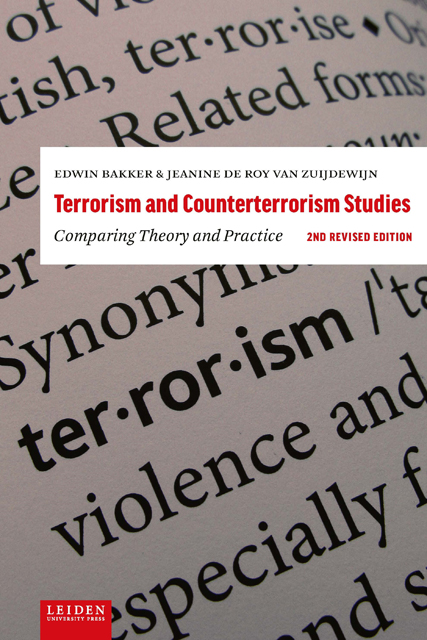Book contents
- Frontmatter
- Contents
- List of boxes & figures
- Preface
- About the authors
- Acknowledgements
- 1 Definition and nature of terrorism
- 2 History of terrorism
- 3 Terrorism studies
- 4 Assumptions about terrorism
- 5 Assumptions about counterterrorism
- 6 Dealing with the impact of terrorism
- 7 Trends and developments in (counter)terrorism and a future research agenda
- Index
3 - Terrorism studies
Published online by Cambridge University Press: 12 January 2023
- Frontmatter
- Contents
- List of boxes & figures
- Preface
- About the authors
- Acknowledgements
- 1 Definition and nature of terrorism
- 2 History of terrorism
- 3 Terrorism studies
- 4 Assumptions about terrorism
- 5 Assumptions about counterterrorism
- 6 Dealing with the impact of terrorism
- 7 Trends and developments in (counter)terrorism and a future research agenda
- Index
Summary
Introduction
In this chapter we will look into the field of terrorism studies and introduce different authors, centres, disciplines and approaches. What have academia and think tanks come up with since 9/11? We will also focus on why conducting research in the field of terrorism is so difficult. What are the particular challenges when investigating this phenomenon and the attempts to counter or to manage it? Finally, we will have a critical look at the results of research on terrorism and counterterrorism and discuss the state of the art of this multidisciplinary field of study.
The history of terrorism studies
As shown in the previous chapter, terrorism is not new, and this also holds for the study of this phenomenon. In this section we will look at research into modern-day terrorism, meaning the terrorism that emerged in the late 1950s and early 1960s.
Terrorism studies pre-9/11
In the late 1950s and the 1960s relatively few scholars looked into the political violence and so-called ‘revolutionary terrorism’ of that age. They focused on a number of the fundamental questions: Why do people fight? Why do they use violence? Why do they rebel? Scholars tried to answer these questions, amongst others, with the help of conflict theories. These theories were partly derived from the work of sociologists and political scientists who emphasised the social, political or material inequality of groups in society. Relatively many scholars were influenced by the works of Karl Marx, who is regarded as the father of the social conflict theory. They were particularly interested in the phenomenon of violence related to the decolonisation process in Africa and Asia, but also in riots and political violence in Western European and North American cities and university campuses. These types of political violence were studied under the name of either terrorism studies or political violence studies. The groups they studied included revolutionary terrorist groups and anti-colonial or anti-imperialist groups. These particular groups were active in the era of what Rapoport called the third wave of terrorism or the new left wave. In the 1970s, some of the organisations of that wave received a fair amount of scholarly attention, in particular the Red Army Faction (RAF) in Germany (see box 3.01), the Red Brigades in Italy, the Weathermen in the US and the Tupamaros in Uruguay (see box 3.02).
- Type
- Chapter
- Information
- Terrorism and Counterterrorism StudiesComparing Theory and Practice, pp. 71 - 108Publisher: Amsterdam University PressPrint publication year: 2022

